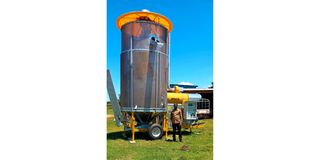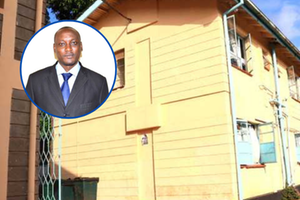
Eliud Rugut is the founder of Silo Africa, a company that provides innovative grain storage solutions.
Africa grows enough food to feed its people, yet nearly half is lost post-harvest, mainly due to poor storage. Weevils, mould, and mycotoxins destroy millions of tonnes of grain annually, undermining food security and threatening the livelihoods of farmers across the continent.
The situation is worsened by poor infrastructure, improper handling, and the effects of climate change. As much as 40 per cent of harvested grain is wasted every year, impacting food availability, rural incomes, and economic development.
Addressing this issue is critical to securing Africa’s food future and improving the livelihoods of smallholder farmers, who are the backbone of the continent’s agriculture.
Staggering loss
Silo Africa, founded by Eliud Rugut, is working to make a difference by providing innovative grain storage solutions that help farmers reduce losses.
“We combine cutting-edge technology, sustainable practices, and accessible infrastructure to transform how grains are stored, preserved, and marketed,” he says, adding that growing up in rural Kenya, he witnessed the heartbreak of grain spoiling due to pests, aflatoxins, and poor storage. The impact went beyond his family’s income, affecting the dignity and stability of the entire community. Without reliable storage, many farmers were forced to sell their grain immediately after harvest, often at rock-bottom prices. Rugut calls this pattern “distress sales,” a cycle that keeps smallholders trapped in poverty.
“That’s the gap that inspired Silo Africa. We realised the real need was for a smart, modular, locally made storage system, one that protects grain and connects farmers to market intelligence, financing, and better prices,” explains Rugut.
This insight led to the development of SmartSilo and SiloCloud, integrated solutions built with farmers, for farmers, designed to unlock the full value of every harvest. SmartSilo is a high-tech storage system equipped with SiloSense IoT technology and connected to the SiloCloud platform, giving farmers powerful tools to manage storage conditions, monitor grain quality, and access markets more effectively.
Beyond traditional methods
Traditional grain storage methods such as granaries, sacks, plastic silos, and hermetic bags, often fail to protect against pests, moisture, and rodent damage. These vulnerabilities contribute significantly to the high post-harvest losses farmers face, forcing many to sell quickly at low prices to avoid spoilage.
"The SmartSilo is built for smallholder farmers, a durable, airtight solution that keeps grain safe for over seven years without using chemicals. A simple candle is lit inside the sealed silo to deplete oxygen, creating an environment that kills pests without chemicals," he says.
Designed as a long-term investment, the SmartSilo is a metal storage unit that safeguards against pests, rodents, and spoilage. It employs a straightforward, chemical-free method to considerably extend the grain storage life and can endure for up to 20 years, providing value season after season.
Equipped with SiloSense, an IoT device that monitors temperature, humidity, CO₂, and grain levels, it provides farmers with real-time visibility of storage conditions. “By tracking key factors like temperature, humidity, and oxygen levels, it helps maintain an ideal environment, extending shelf life and reducing spoilage risk.”
Farmers receive alerts about potential issues, such as rising temperatures or moisture that could lead to mould or attract pests. The SiloCloud platform connects all SmartSilos to a user-friendly digital dashboard accessible remotely.

Silo Africa offers SmartSilo in 12 sizes, from small units holding 2 bags to large silos for 40 bags.
Empowering farmers
It provides users with real-time access to storage conditions, inventory levels, and estimates of how long the grain can be stored safely. Additionally, it allows users to view price trends, demand forecasts, and manage logistics.
This transparency helps farmers avoid distress selling and instead sell strategically when prices are favourable. It supports group sales, traceability, and digital finance, enhancing farmers’ bargaining power and market efficiency.
"Too often, grain is sold early or spoiled in storage due to a lack of visibility. SiloCloud solves that. Soon, farmers will be able to trade directly through smart contracts, backed by financial partners, making transactions faster and more transparent,” says the businessman.
Rugut highlights early challenges, especially securing funding for the capital-intensive hardware and IoT solution. They bootstrapped while seeking supportive partners like Heifer International, E4Impact, and the Kenya Farmers Association.
Developing durable, locally sourced materials and adapting SmartSilo for real farm conditions required extensive research and development. Market adoption was slow initially due to farmers’ unfamiliarity with metal silos and digital tools, but trust grew through demos, pilots, and training, leading to organic demand growth.
“We offer 12 different sizes of silos, ranging from smaller units that hold 2 bags of grain, priced at around Sh9,000, to larger silos for 40 bags, costing about Sh38,000,” he says.
To make these silos more accessible, they have introduced flexible payment options, including our popular "Pay As You Store" plan (lipa mdogo mdogo), which allows farmers to pay in small instalments.
This means farmers do not have to pay the full amount upfront. Instead, they can gradually pay off their silo over two harvest seasons while safely storing their grain. By that time, many farmers had already recouped their investment through better prices and reduced losses.
They have also partnered with financial institutions that provide affordable, patient capital, enabling farmers to utilise their stored grain as collateral.
“Our solutions support the African Union and Kenya’s strategies to reduce food losses, improve safety, and build climate-resilient systems. We reduce spoilage, cut methane emissions, and promote sustainable farming, protecting both farmers' health and the environment,” he says.
As climate change intensifies, SmartSilo helps African farmers build resilience by enabling long-term grain storage. This allows strategic selling during favourable market conditions, reduces losses, and ensures food availability during lean periods. Safely stored grains also buffer against extreme weather impacts, strengthening farmers’ capacity to withstand droughts, floods, and price shocks.
Scaling Silo Africa across the continent presents challenges such as limited farmer access to finance, poor infrastructure, and high taxes on essential materials.






